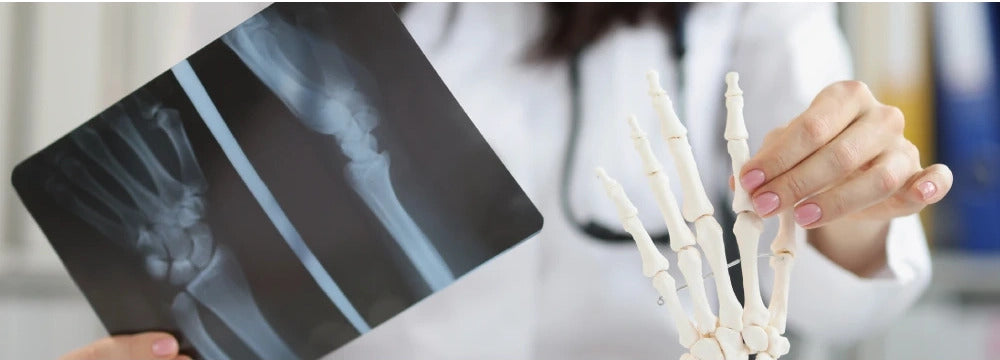Unlocking the Truth About Osteoporosis: Myths, Risks, and How to Strengthen Your Bones
Osteoporosis, the silent bone-weakening disease, can catch many people off guard, often only revealing its presence through unexpected fractures or subtle signs like spinal curvature. This condition, with its potential to make bones fragile and prone to breakage, can lead to severe consequences, even from seemingly minor incidents like coughing or bending. In this article, we'll explore the science-backed strategies to safeguard your bone health and keep osteoporosis at bay.
What is Osteoporosis?
Osteoporosis, aptly named for its "porous bone" nature, results from a loss of bone density, leaving bones fragile, sponge-like, and susceptible to fractures. The disease can manifest without clear symptoms, making it a hidden menace until a fracture occurs. The impact is staggering, with osteoporosis affecting nearly 54 million Indians. Although it predominantly targets the elderly, the groundwork for healthy bones or the risk of developing osteoporosis begins much earlier in life. Hence, adopting bone-healthy habits in your 20s, 30s, and 40s is pivotal.
Causes of Osteoporosis:

Multiple factors contribute to the gradual weakening of bones. Some are beyond our control, like age, gender, family history, and physique. Hormonal changes associated with aging, such as increased parathyroid hormone levels, also elevate osteoporosis risk. However, lifestyle choices wield significant influence. Smoking, sedentary living, extreme weight conditions, excessive alcohol consumption, inadequate fruit and vegetable intake, high protein and sodium consumption, and insufficient levels of calcium, vitamin D, magnesium, and vitamin B12 all amplify the risk of osteoporosis. Additionally, specific medications, certain health conditions, like Celiac disease or cancer, and some common drugs can further predispose individuals to this condition.
Preventing Osteoporosis - The Role of Calcium:

The popular belief linking strong bones to dairy consumption, particularly for its calcium content, is more marketing than science. Numerous studies reveal that a high calcium diet, even from dairy sources, doesn't necessarily prevent fractures. Paradoxically, regions with high dairy consumption often exhibit elevated osteoporosis rates. For instance, a study in the Harvard Nurses' Health Study found that women who consumed more dairy products experienced more bone fractures. Therefore, while calcium is essential, excessive intake doesn't guarantee better bone health. Instead, plant-based sources of calcium, such as green leafy vegetables, beans, legumes, broccoli, whole grains, dried fruits, and seeds, offer a more balanced approach.
What to Avoid for Osteoporosis Prevention:

Several dietary and lifestyle choices can work against maintaining healthy bones. High sodium intake, commonly found in fast food and processed foods, can lead to calcium loss. Wheat bran, rich in phytic acid, inhibits calcium absorption. Excessive alcohol, caffeine, and certain types of soda can contribute to bone loss. Animal protein, particularly high in sulfur-containing amino acids, may promote calcium leaching from bones. This occurs because sulfur-containing amino acids convert to sulfate, acidifying the blood and prompting the body to release calcium from bones as a buffer.
Preventing Osteoporosis with Lifestyle Strategies:

Incorporating calcium-rich, plant-based foods and avoiding bone-detrimental substances are vital, but exercise also plays a crucial role. Weight-bearing exercises, including walking, running, weight-lifting, and more, stimulate bone strength by stressing bones, prompting them to fortify. It is recommended to engage in at least 30 minutes of weight-bearing exercise most days of the week, but caution is advised for individuals with severe osteoporosis. They should initiate exercise gradually, under professional guidance, focusing on stability, balance, flexibility, and strength training exercises. An innovative approach known as Whole Body Vibration technology is worth exploring, as it strengthens bones and muscles through gentle vibrations.
Vitamins for Bone Health:

Vitamin D is indispensable for calcium absorption and muscle function, with sun exposure being a primary source. However, vitamin D supplements can be necessary, especially in cases of deficiency. Vitamin K2 complements vitamin D by ensuring calcium is directed into bones rather than accumulating in the bloodstream and organs. Plant-based eaters may benefit from K2 supplements since its conversion from K1 in the gut is not always efficient. Additionally, vitamin B12 plays a role in bone health, as pernicious anemia and B12 deficiency correlate with osteoporosis risk. Since many individuals, including non-vegans, face B12 deficiency, supplementation is recommended.
Conclusion:
Osteoporosis is a pervasive concern, but proactive steps can mitigate its impact. A diet rich in calcium from plant sources, avoidance of calcium-depleting elements, regular weight-bearing exercise, adequate vitamin D, K2, and B12, form the foundation of strong bone health. By embracing these habits early and maintaining them throughout life, you can fortify your skeleton and ensure a resilient, bone-healthy future.

